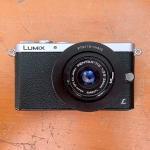-
Posts
3,169 -
Joined
-
Last visited
About fuzzynormal

Profile Information
-
Gender
Not Telling
-
Location
planet
-
Interests
things
-
My cameras and kit
bunch of old stuff
Contact Methods
-
Website URL
n/a
Recent Profile Visitors
15,392 profile views
fuzzynormal's Achievements

Long-time member (5/5)
2.4k
Reputation
-
 kye reacted to a post in a topic:
How do you do video mode on the gx80?
kye reacted to a post in a topic:
How do you do video mode on the gx80?
-
I have an outdoor shoot coming up and have been meaning to roll over my ND stuff. Might give it a go. https://shorturl.at/RWJJi https://shorturl.at/TE7qr
-
 Sebastien reacted to a post in a topic:
How do you do video mode on the gx80?
Sebastien reacted to a post in a topic:
How do you do video mode on the gx80?
-
 John Matthews reacted to a post in a topic:
How do you do video mode on the gx80?
John Matthews reacted to a post in a topic:
How do you do video mode on the gx80?
-
In general, when shooting video you don't really want SS, fstop, and ISO changing. Best if they stay where they're at. The ideal way to control exposure, as others have said, is to work with ND filters. I absolutely hate the look of fast shutter speed video. In fact, if I'm shooting, say, 30p, I'll even slow the shutter to 30 as well. It's just a look I like. 180 rule? No thanks, not for me. OTOH, if that high speed shutter judder doesn't bother you, then you can always allow that to be the variable that changes your exposure. It's the default variable for phones shooting vid so it's kind of a 'thing' now anyway.
-
 kye reacted to a post in a topic:
New travel film-making setup and pipeline - I feel like the tech has finally come of age
kye reacted to a post in a topic:
New travel film-making setup and pipeline - I feel like the tech has finally come of age
-
 John Matthews reacted to a post in a topic:
New travel film-making setup and pipeline - I feel like the tech has finally come of age
John Matthews reacted to a post in a topic:
New travel film-making setup and pipeline - I feel like the tech has finally come of age
-
The best practice for trying to hone a craft is to find something youre impressed with, deconstruct it, and then rebuild it yourself. Learn to walk before you fly. Editing is relatively easy but it's tedium too. Discover if it's what you want to do by doing it. If you make something decent and compelling you'll know by the end of the process if it's something you want to go through again.
-
 EduPortas reacted to a post in a topic:
Adolescence (2025) camera and gear - Implications for the industry
EduPortas reacted to a post in a topic:
Adolescence (2025) camera and gear - Implications for the industry
-

Adolescence (2025) camera and gear - Implications for the industry
fuzzynormal replied to EduPortas's topic in Cameras
The irony being that that 80 inch TV has frame interpolation and computational image enhancement engaged on it by default. Anyone on this forum have people in their lives that bother to adjust their "smart" tvs beyond accessing their channels? I'm guessing not many. Home TV sets are now literally built to destroy the original image. And here are all of us hobbyist technicians trying to maintain the most pristine IQ. Might be an Exercise in futility. -
 John Matthews reacted to a post in a topic:
Adolescence (2025) camera and gear - Implications for the industry
John Matthews reacted to a post in a topic:
Adolescence (2025) camera and gear - Implications for the industry
-

Adolescence (2025) camera and gear - Implications for the industry
fuzzynormal replied to EduPortas's topic in Cameras
Weren't a lot of the most influencing and creative films ever made done with equipment significantly less sophisticated than all of this modern stuff? So... I don't get too wrapped up in the new fangled gear. It's all rather incredible, realitvely, tbh. -
Yup. All those things. Brought in as an editor after 6 years into the production. Just didn't have a decent director. Or producer. Or a writer. Or a DP. So yeah, a few issues. Things happen. It's a wierd business. Sometimes you end up working with people a bit over their heads.
-
 ac6000cw reacted to a post in a topic:
The best film-making advice I ever got
ac6000cw reacted to a post in a topic:
The best film-making advice I ever got
-
 eatstoomuchjam reacted to a post in a topic:
The best film-making advice I ever got
eatstoomuchjam reacted to a post in a topic:
The best film-making advice I ever got
-
I just worked with a "director" on a mil+ budget doc that completely failed at this fundamental. God, what a waste of time. Got paid, but it was soul crushing trying to make an edit out of a pile of crap. Bleh.
-
 Thpriest reacted to a post in a topic:
New US camera import tariffs - 25-50%
Thpriest reacted to a post in a topic:
New US camera import tariffs - 25-50%
-
Anecdotally, I'm not experiencing it getting better in my neck of the woods.
-
Let us know how it goes. I have the 12 and find using it for video is too fiddly for me to enjoy it. I've captured great shots with it, but not without effort.
-
Dark Enlightenment is a thing. Sure, you get a bigger number for selling used, but the money you get for it buys less as inflation screams upward. Hooray.
-
Seems like there's a goal for all of this. Wonder what that is? One can only imagine. Assuming we're allowed to imagine and aren't put to death by the state beforehand. What would supply side Jesus do?
-
Is this global re-alignment ultimately going to be a bad thing? As an American I do wonder if things might improve for humanity if or time on the global stage concludes. False optimism? I'm not a fan of human exploitation and hyper consumerism. Environmental abuse is disheartening. I don't suspect the USA would curb any of it. Would the next global power do so? I really don't know. Such a bummer that such promising ideals of this new nation were never met, nor could be. Would have been nice to keep trying.
-
It's more than half, just not by enough. Minority rule. As all totalitarian states are. Plus, there's a lot of the sane ones that like to claim they "don't do politics" Well, politics is about to "do" you. And, you know, this fascist playbook we're seeing here in the USA is a book that is wide open. It's easy to read because it's simple. The ones that are attracted to that are insatiable. And the book has been used numerous times by bad people because it works. What's happening here is neither new or abnormal. These folks and their followers are ridiculous people that are gross, small, mentally horrible, and should be shamed for their terrible attitudes, but they've built political momentum and they're very close to reaching their orbit. The journey leads no where good. Not even for them. Finally, I like shooting f8 on an M43rd sensor. It's "Spielbergean cinema"! (gotta stay relevant to the website after that rant; cleanse the mental palette)
-
I really thought I'd die before the down fall of the USA. Mind, I figured the downfall was inevitable, like all things, but I suspected it would be late 21 st century, not early -- while I'll be checking out in the mids; could've missed it. Bleh.








